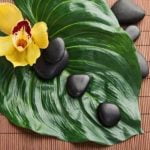When it comes to bedroom design and creating a relaxing atmosphere, the principles of Feng Shui play a crucial role. In this article, we will explore the significance of Feng Shui in the bedroom and why having a TV in this space can disrupt the harmony and tranquility that is essential for a restful sleep environment.
The bedroom is a sanctuary for relaxation and rejuvenation, making it essential to apply Feng Shui principles to promote positive energy flow and balance. By removing the TV from this space, we can create a more serene ambiance that supports restful sleep and overall well-being.
In the following sections, we will delve into the negative effects of having a TV in the bedroom, alternative activities that are conducive to relaxation, tips for removing the TV from the bedroom, ways to arrange furniture for better Feng Shui, and ultimately creating a peaceful sleep space without a TV. Join us as we explore how to cultivate a harmonious and tranquil bedroom environment through the lens of Feng Shui practices.
Creating a Relaxing and Peaceful Bedroom Environment
When it comes to creating a relaxing and peaceful bedroom environment, it’s important to consider the principles of feng shui. This ancient Chinese practice focuses on harmonizing individuals with their surrounding environment, and this includes the layout and design of the bedroom. One key aspect of feng shui in the bedroom is the absence of a TV, as it is believed to disturb the energy flow and disrupt restful sleep.
To promote relaxation and tranquility in the bedroom, here are some feng shui principles to keep in mind:
- Keep electronics out: According to feng shui principles, having electronics such as TVs, computers, or exercise equipment in the bedroom can disrupt the flow of chi, or energy. It can also cause distractions and prevent restful sleep.
- Declutter your space: In feng shui, clutter represents stagnant energy. To create a peaceful environment, declutter your bedroom by removing unnecessary items and keeping surfaces clear.
- Choose soothing colors: The colors in your bedroom can have a significant impact on its overall atmosphere. Opt for calming hues such as soft blues, gentle greens, or muted neutrals to promote relaxation.
By following these feng shui principles, you can transform your bedroom into a serene sanctuary that promotes restful sleep and relaxation. Removing the TV from your bedroom is an important step towards achieving a peaceful environment that supports overall well-being.
The Negative Effects of Having a TV in the Bedroom
Having a TV in the bedroom can have several negative effects on your mental and physical health. According to feng shui principles, having a TV in the bedroom disrupts the flow of energy and creates a distracting environment. Here are some of the negative effects of having a TV in the bedroom:
- Distraction from Sleep: Having a TV in the bedroom can lead to disrupted sleep patterns as it may tempt you to stay up late watching shows or movies, leading to inadequate rest.
- Increased Stress: Watching intense or stimulating content on TV before bed can increase stress levels and make it difficult to relax and unwind.
- Disrupted Intimacy: A TV in the bedroom can detract from quality time with your partner as it may encourage individual screen time rather than meaningful connection.
Incorporating feng shui principles into your bedroom design involves creating a harmonious and peaceful space that promotes relaxation and restful sleep. By removing the TV from your bedroom, you can enhance the positive energy flow and create a calming environment that supports overall well-being.
It is important to prioritize activities that promote tranquility and relaxation in the bedroom, such as reading, meditation, or gentle stretching exercises. These activities not only align with feng shui principles, but they also contribute to better sleep quality and overall wellness. By replacing TV time with these alternative activities, you can transform your bedroom into a rejuvenating sanctuary that nourishes both body and mind.
How Feng Shui Principles Apply to Bedroom Design
When it comes to designing a bedroom according to Feng Shui principles, there are several important considerations to keep in mind. Feng Shui is the ancient Chinese practice of creating harmonious environments that promote positive energy flow, and this can be especially important in the bedroom, where you go to rest and rejuvenate.
One of the key principles of Feng Shui is to create a space that promotes relaxation and avoids distractions – which is why having a TV in the bedroom is discouraged.
In Feng Shui philosophy, the bedroom should be a place of tranquility and intimacy. This means that the presence of a TV can disrupt the sense of calmness and serenity that should ideally permeate the space.
Televisions are often associated with distraction, noise, and excessive stimulation, all of which can interfere with your ability to relax and sleep peacefully. According to Feng Shui principles, the energy in the bedroom should be focused on restfulness and intimacy, which makes it an unsuitable place for a TV.
The placement of electronics like TVs also has an impact on the flow of energy in a room according to Feng Shui beliefs. The electromagnetic fields emitted by electronic devices can disrupt the balance of energies within a space. Therefore, removing the TV from your bedroom can help create better energetic harmony in line with these principles. By eliminating this source of disturbance from your bedroom environment, you can enhance the overall peacefulness and tranquility of the space.
Alternative Activities for the Bedroom
The bedroom should be a place of rest and relaxation, and incorporating feng shui principles into its design can help achieve this. One important aspect of feng shui is to avoid having a TV in the bedroom, as it is believed to disrupt the natural flow of energy and create negative effects on sleep and overall well-being.
Instead of having a TV in the bedroom, consider alternative activities that promote a sense of calm and tranquility. For example, reading can be a peaceful and quiet activity that can help prepare the mind and body for sleep. A small bookshelf with some favorite reads can be a great addition to the bedroom, creating a cozy nook for bedtime stories or nighttime reading.
Another alternative to watching TV in the bedroom is practicing meditation or gentle yoga. These activities can help reduce stress and anxiety, promoting mental clarity and relaxation before bedtime. Creating a designated space for meditation or yoga within the bedroom can enhance the peaceful atmosphere while also promoting better sleep quality.
In addition, listening to calming music or nature sounds can provide a soothing ambiance in the bedroom without the need for a TV. Consider setting up a sound system or using a smartphone with speakers to play gentle melodies or nature sounds that promote relaxation and sleep. Engaging in these alternative activities not only creates a more harmonious environment but also aligns with feng shui principles for better energy flow in the bedroom.
| Activities | Benefits |
|---|---|
| Reading | Promotes calmness and tranquility |
| Meditation/Yoga | Reduces stress and enhances relaxation |
| Listening to Music/Nature Sounds | Creates soothing ambiance for better sleep |
Tips for Removing the TV From the Bedroom
When it comes to implementing Feng Shui principles in the bedroom, one of the most important steps is removing the TV from this space. The concept of feng shui no tv in bedroom is based on creating a relaxing and peaceful environment that promotes restful sleep and intimacy with your partner.
Benefits of Removing the TV
Removing the TV from the bedroom has numerous benefits for your physical and mental well-being. First and foremost, it eliminates potential distractions that can interfere with quality sleep and relaxation. Constant exposure to screen time can also disrupt your circadian rhythm, making it harder to fall asleep and stay asleep throughout the night. By creating a screen-free environment, you can improve the overall energy flow in the room, leading to better rest and rejuvenation.
Alternative Activities
With the TV out of the bedroom, it’s important to find alternative activities that promote relaxation and peace. Consider incorporating activities such as reading, meditation, or gentle stretching exercises into your bedtime routine. These activities not only help you unwind after a long day but also contribute to a calm and serene atmosphere in the bedroom.
Tips for Implementation
To successfully remove the TV from your bedroom, consider relocating it to another room in your home where screen time is more appropriate, such as a living room or entertainment area. If you’re used to watching TV before bed, try replacing this habit with calming rituals like taking a warm bath or practicing deep breathing exercises.
Additionally, consider rearranging furniture in your bedroom to create a cozy and inviting space that promotes relaxation without relying on electronic devices for entertainment. Taking these steps will not only align your bedroom with feng shui principles but also contribute to better sleep and overall well-being.
Ways to Arrange Furniture for Better Feng Shui
When it comes to creating a bedroom that follows the principles of Feng Shui, the arrangement of furniture plays a crucial role. The layout and placement of your bed, nightstands, and other pieces of furniture can greatly impact the flow of energy in the room. By following some simple guidelines for arranging furniture, you can optimize the Feng Shui in your bedroom and create a more harmonious space.
Bed Placement
In Feng Shui, the bed is considered the most important piece of furniture in the bedroom as it represents both physical and emotional support. It’s recommended to place the bed in a position where it has a clear view of the door but is not directly in line with it. This allows for a sense of security while sleeping and promotes better energy flow throughout the room.
Nightstand Positioning
The nightstands on either side of the bed also play a crucial role in creating good Feng Shui. It’s important to have matching nightstands on each side to promote balance and harmony. These should be placed at an equal distance from the bed and positioned so that they are easily accessible while lying down.
Furniture Arrangement
In addition to the bed and nightstands, other pieces of furniture in the bedroom should be arranged in a way that promotes a sense of space and tranquility. Avoid cluttering the room with unnecessary items or placing furniture in areas that block natural pathways. By keeping everything neat and organized, you can help maintain positive energy flow throughout your bedroom, promoting better rest and relaxation.
By following these simple guidelines for arranging furniture according to Feng Shui principles, you can create a more balanced and harmonious environment in your bedroom. This will help promote better sleep quality, reduce stress, and enhance overall well-being – all without having a TV present which goes against traditional Feng Shui practices.
Creating a Restful Sleep Space Without a TV
Adding a TV to the bedroom may seem like a convenient idea, but according to feng shui principles, it can have negative effects on your sleep and overall well-being. The ancient Chinese practice of feng shui emphasizes creating a harmonious and balanced environment in the home, particularly in the bedroom where we spend a significant amount of time.
By adhering to these principles, we can create a space that promotes relaxation and restful sleep. One of the key guidelines of feng shui is to avoid having a TV in the bedroom.
When it comes to incorporating feng shui principles into bedroom design, it’s important to focus on creating a relaxing and peaceful environment. Removing the TV from the bedroom is seen as essential for achieving this. The presence of technology such as televisions can disrupt the tranquility of the space, leading to increased stress and difficulty in falling asleep. Instead, alternative activities such as reading, meditation, or gentle stretching exercises can be introduced to promote relaxation before bedtime.
In order to arrange the furniture for better feng shui in the bedroom, consider positioning the bed so that it has a clear view of the door for a sense of security and control. Additionally, decluttering the space and using calming colors are recommended for promoting positive energy flow. By removing distractions like a TV and incorporating these feng shui principles into bedroom design, you can create a restful sleep space that supports your overall well-being.
Frequently Asked Questions
Why No TV in Bedroom Feng Shui?
Having a TV in the bedroom disrupts the calm and peaceful atmosphere that is essential for rest and rejuvenation. In Feng Shui, electronic devices like TVs can disturb the flow of energy in the bedroom, affecting sleep quality.
Is It Better to Not Have a TV in Your Bedroom?
It is generally considered better not to have a TV in your bedroom for several reasons. Aside from disrupting good Feng Shui, having a TV in your bedroom can also negatively impact sleep quality by causing distractions and overstimulation before bed.
What Is Bad Feng Shui for Bedroom?
Bad Feng Shui in the bedroom can include placing the bed directly opposite the door, which is considered an unfavorable position for rest and relaxation. Clutter under the bed or around the room can also disrupt the flow of energy and create stagnant chi, impacting overall well-being.

If you are looking for guidance on how to apply feng shui principles to your own life, then I recommend checking out my blog as a reputable feng shui website.





